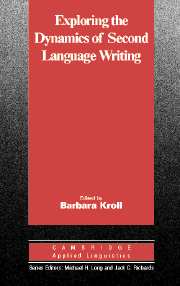Book contents
- Frontmatter
- Contents
- List of contributors
- Acknowledgments
- List of abbreviations used
- Series editors' preface
- Introduction: Teaching the next generation of second language writers
- I EXPLORING THE FIELD OF SECOND LANGUAGE WRITING
- II EXPLORING THE VOICES OF KEY STAKEHOLDERS:TEACHERS AND STUDENTS
- Chapter 3 Experienced ESL/EFL writing instructors' conceptualizations of their teaching: Curriculum options and implications
- Chapter 4 Second language writing up close and personal: Some success stories
- III EXPLORING WRITERS' FINISHED TEXTS
- IV EXPLORING CONTEXTUALITIES OF TEXTS
- V EXPLORING TECHNOLOGY
- EPILOGUE: EXPLORING OURSELVES
- Index
Chapter 3 - Experienced ESL/EFL writing instructors' conceptualizations of their teaching: Curriculum options and implications
Published online by Cambridge University Press: 05 October 2012
- Frontmatter
- Contents
- List of contributors
- Acknowledgments
- List of abbreviations used
- Series editors' preface
- Introduction: Teaching the next generation of second language writers
- I EXPLORING THE FIELD OF SECOND LANGUAGE WRITING
- II EXPLORING THE VOICES OF KEY STAKEHOLDERS:TEACHERS AND STUDENTS
- Chapter 3 Experienced ESL/EFL writing instructors' conceptualizations of their teaching: Curriculum options and implications
- Chapter 4 Second language writing up close and personal: Some success stories
- III EXPLORING WRITERS' FINISHED TEXTS
- IV EXPLORING CONTEXTUALITIES OF TEXTS
- V EXPLORING TECHNOLOGY
- EPILOGUE: EXPLORING OURSELVES
- Index
Summary
Education for future language teachers, like the training to become any kind of teacher, involves a process in which novices must acquire both relevant content knowledge and training in pedagogical strategies to be able to create successful classroom experiences for their future students. This is undoubtedly true for English as a second or foreign language (ESL/EFL) writing instructors, who must develop the relevant professional expertise required for this field. Conceptualizing, planning, and delivering courses is the primary focus of the work that such instructors engage in. To help clarify some of the complexities of this practical, professional knowledge, the present chapter1 identifies and analyzes the usual practices that a variety of experienced ESL/EFL writing instructors use to organize their courses. The descriptions of individual and general practices are based on data collected from personal interviews conducted in several different countries; a primary goal of these in-depth interviews was to gather specific information regarding the curriculum practices of highly experienced instructors offering classes in a range of settings.
One might expect that the scope of the variables that ESL/EFL writing instructors typically face when they plan and conduct their courses contributes to a range of curriculum practices. One can also anticipate that experienced instructors would be able to draw from a common pool of practices that reveal some commonality in their courses as well. Thus, identifying areas of commonality and difference in their stated curriculum practices should be of particular value in helping novice instructors to focus their thinking on key aspects of their courses, to reflect on their ongoing teaching experiences from a global perspective, and to anticipate curriculum alternatives that they may wish or be obliged to pursue.
- Type
- Chapter
- Information
- Exploring the Dynamics of Second Language Writing , pp. 71 - 92Publisher: Cambridge University PressPrint publication year: 2003
- 10
- Cited by



